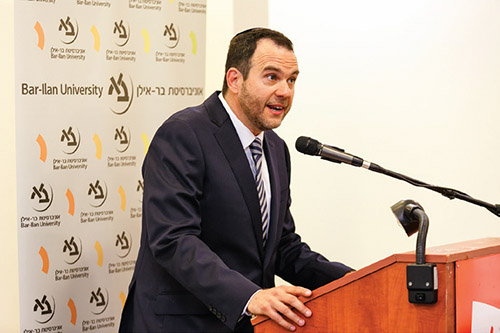
Earlier this year, Bar-Ilan University launched the Impact Center for the Study of Judaism in Israel and North America. According to Professor Adam Ferziger of the Department of Jewish History and Contemporary Jewry at Bar-Ilan University, founding director of the center, “It was clear to me already a couple of years ago that the relationship between the two major Jewish centers of our era, Israel and North America, was being tried. There are a lot of tensions that have emerged. I began to teach my students and speak about this issue publicly and write about it in various forums, and then at a point I went to the leadership of Bar-Ilan University and said we have to do something about this. Bar-Ilan is recognized as a research university with the strongest faculty of Jewish studies in the world and we have unique resources to address this.”
Ferziger told The Jewish Link, “There are quite a few frameworks in the U.S. and Israel that focus on politics, relationship to Israeli policies in post-1967 border areas, relationships between Israelis and Arabs and geopolitical issues. However, there is no university-sponsored center that focuses on Judaism in Israel and North America. The point of departure for our center is that inasmuch as Judaism is a world religion that is not dependent on a geographic framework, the rise of a sovereign Jewish state in which Judaism is the official religion of the country has had a profound influence. Seventy years of that has an effect. That dynamic distinguishes it from the way that Judaism has evolved over the previous centuries. This center will be focused on flare-ups and tensions between the Israeli and North American Jewish communities that revolve around religion.”
There are three components to the center. One is a cutting-edge research laboratory made up of experts on Jewish life who will explore the nuances, differences and similarities between aspects of religious culture and experience in Israel and North America and seek innovative ways to navigate the tensions that have emerged. The second component will be a graduate program for both Israeli and American students who will study a carefully crafted curriculum with the hope that these students will become future scholars and leaders, well versed in comparative Judaism both in Israel and in North America. Finally, the center will bring together today’s leaders from the entire spectrum of religious life to help conceive and apply solutions that all groups can accept and implement.
“The three parts to the center reflect its purpose—to have impact. We will produce rigorous research that offers a fresh blueprint for the complexities of global Jewish religious culture and develop a strong academic teaching program that will bring together North American and Israeli MA students and develop them into leaders. In parallel, we will build upon Bar-Ilan’s unique ‘convening power’ predicated on a world-class academic reputation along with strong roots in Jewish tradition, which enables it to gather a diverse group of religious decision-makers and leaders into a framework for high-level pragmatic negotiations,” added Fergizer.
He elaborated, “America, in a very meaningful way, has established a vastly rich, diverse Jewish culture with considerable intellectual and institutional resources and its own flavor and uniqueness. There are surely areas that overlap and complement Israeli Judaism, but there are also stark differences. What we want to do is to think through and acknowledge the differences—what constitutes Israeli and American Judaism—and then bringing this awareness to the table, to think about how this comparative knowledge can guide us moving forward.”
Professor Ferziger will be the scholar-in-residence at Congregation Rinat Yisrael on the Shabbat of December 21-22. Friday night he will speak at an oneg at 7:30 p.m. His topic will be “Female Clergy and Male Space: The Ritualization of the Orthodox Rabbi.” He will explore how official responses to advocacy of change in the role of women in Orthodoxy have resulted in a reconstitution of core characteristics of the Orthodox rabbinate. On Shabbat morning he will deliver the drasha at both the 8:30 a.m. and 9 a.m. minyanim. His topic then will be “Jerusalem and Babylon in the 21st Century—The Relationship Between Israeli and American Judaisms.” The address will focus on the foundational distinctions between the two central Jewish civilizations of our era and how acknowledgement of these core differences can facilitate a new positive dynamic moving forward. Following Mincha he will speak on the topic “Love and Death: Reform Marriage and Reform Burial in Contemporary Halakhah.” The lecture, which will utilize printed sources, will focus on the novel approaches of the two most authoritative adjudicators in 20th-century United States, Rabbi Eliyahu Yosef Henkin and Rabbi Moshe Feinstein, toward burial of Jews who choose to be cremated, and how their decisions shed light on their well-known disagreement regarding civil and Reform marriages.
Professor Ferziger is an intellectual and social historian whose research focuses on Jewish religious movements and religious responses to secularization and assimilation in modern and contemporary North America, Europe and Israel. He holds the Samson Raphael Hirsch Chair for Research of the Torah with Derekh Erez Movement in the Department of Jewish History and Contemporary Jewry at Bar-Ilan University. He is the author or editor of six books, the most recent of which, “Beyond Sectarianism: The Realignment of American Orthodox Judaism,” was the winner of the 2015 National Jewish Book Award.
The program is sponsored by Leora and Martin Fineberg in honor and in memory of Leora’s mother, Miriam Adler. All talks are open to the public. The synagogue is located at 389 West Englewood Avenue in Teaneck.
By Sara Kosowsky Gross










